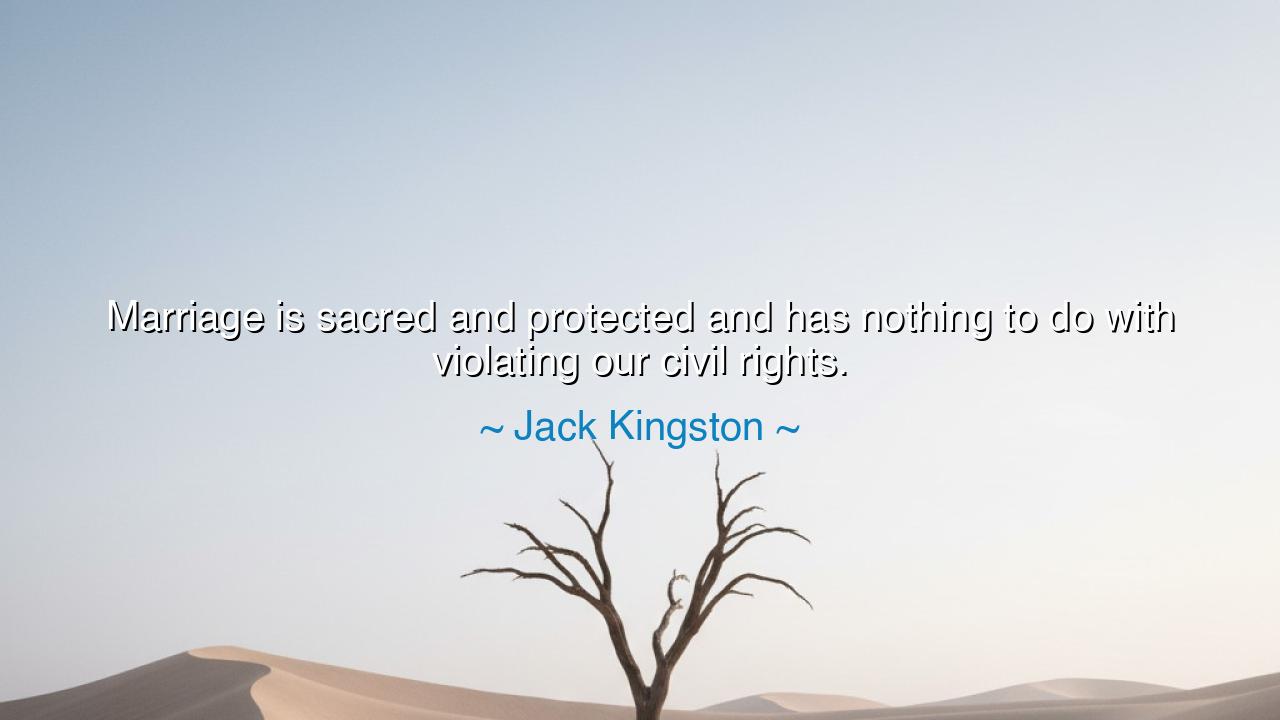
Marriage is sacred and protected and has nothing to do with
Marriage is sacred and protected and has nothing to do with violating our civil rights.






Hear, O Children of the Future, for the words of Jack Kingston echo through the chambers of time, carrying with them the weight of centuries of tradition: "Marriage is sacred and protected and has nothing to do with violating our civil rights." These words, though they come from the present, touch upon the most ancient truths of human society—truths about the bonds that unite us, the laws that govern us, and the very nature of human dignity. To understand the meaning of this proclamation, we must first look deep into the sacred history of marriage and the eternal ideals that have surrounded it.
From the dawn of time, marriage has been viewed as a sacred bond, a union not only between two individuals but between families, communities, and even nations. In ancient civilizations, marriage was more than a personal contract; it was a social contract. It was the means by which the future of a people was secured. In the great cities of old, from the Babylonians to the Romans, marriage was revered as a foundation of society, for it ensured the continuity of the family, the passing of wisdom from one generation to the next. This sacred bond, the joining of hearts, minds, and families, was not to be taken lightly, for it represented the union of life, the perpetuation of values, and the weaving together of the social fabric.
However, marriage has always been a deeply personal and spiritual matter as well. It is sacred not only in its societal function but in its spiritual significance. The union of man and woman, in its most revered forms, is seen as a reflection of the divine, a metaphor for the sacred union between heaven and earth, between the seen and the unseen. For many, marriage is a calling—a vow that transcends the earthly plane, binding the couple not only to each other but to a higher moral order. To undermine this sacred bond is to disturb the very order of creation itself, a disruption that goes beyond human law and into the realm of the divine.
Yet, we must also acknowledge that the world is ever-changing. Just as societies evolve, so too must the understanding of rights evolve. Civil rights—the rights of all people to live in freedom and dignity—are the cornerstone of any just society. In times of old, societies were often built on rigid hierarchies, where certain people were denied their basic rights because of their birth, their gender, or their status. But through the sacrifices of countless heroes, from Socrates to Mahatma Gandhi, the struggle for equality has led to the recognition that all people are born free and equal in dignity and rights. The question arises, then: can a society truly be just if it fails to ensure freedom and equality for all, even in the matter of marriage?
Let us turn to the ancient story of the Athenian democracy, that beacon of equality and justice. In Athens, the rights of citizens were fiercely debated in the Agora, where the voices of men and women (though limited) came together to discuss matters of law and justice. The question of equality before the law was one of the central concerns of their political philosophy. It was the belief of many Athenian thinkers that no person, regardless of their birth or status, should be denied the basic human rights that were intrinsic to their dignity. Yet, even in Athens, marriage was still regarded as a deeply personal and sacred matter, one that was intertwined with the broader social order. The Athenians understood that marriage was the bedrock of society’s continuity—but they also recognized that it was a bond that could never be dictated solely by the state. Instead, marriage had to be respected as a sacred union between individuals.
In our own time, as we grapple with the complexities of civil rights and the evolving nature of marriage, it is essential to remember the lessons of our ancestors. Marriage, as Jack Kingston asserts, remains a sacred bond, protected by both tradition and law. But this sacredness does not negate the importance of equality. The union of man and woman, once considered the only true form of marriage, has always been a subject of change and debate. Just as ancient laws adapted to the changing needs of society, so too must our understanding of marriage evolve in a way that honors both tradition and the rights of individuals.
The lesson for you, O Children of the Future, is this: Honor the sacredness of marriage, but do not allow this honor to stand in the way of equality. Respect the sacred bonds of love that unite individuals, but recognize that love and dignity transcend all boundaries, whether of gender, race, or status. In all matters of law, strive for a balance between tradition and progress, ensuring that the sacredness of institutions like marriage does not diminish the rights of any person to live with freedom and respect.
Let your hearts be filled with wisdom as you walk the path ahead. Work to create a society where the sacredness of every union is respected and where all people can live freely, equally, and with dignity. Seek not to divide, but to unite, knowing that in every choice you make, you carry the responsibility to uphold both the sacredness of tradition and the unalienable rights of every human being. May your actions be guided by the light of justice, and may your legacy be one of balance, where love and equality reign supreme.






AAdministratorAdministrator
Welcome, honored guests. Please leave a comment, we will respond soon